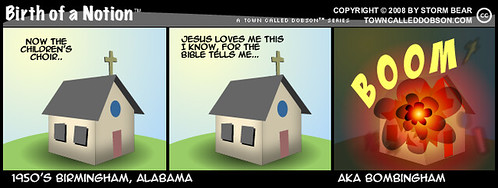 click to enlarge The name "Ku Klux Klan" began to be used by several independent groups. Beginning in the 1950s, individual Klan groups began to resist the Civil Rights Movement by bombing houses in transitional neighborhoods and the houses of activists, as well as by physical violence, intimidation and assassination. In Birmingham, Alabama, during the tenure of Bull Connor, Klan groups were closely allied with police and operated with impunity. There were so many bombings of homes by Klan groups that the city's nickname was "Bombingham". In states such as Alabama and Mississippi, Klan members had alliances with governors' administrations. Many murders went unreported and unprosecuted. Continuing disfranchisement of blacks meant that most could not serve on juries, which were all white. According to a report from the Southern Regional Council in Atlanta, the homes of forty black Southern families were bombed during 1951 and 1952. Some were social activists whose work exposed them to danger, but most were either people who refused to bow to racist convention or were innocent bystanders, unsuspecting victims of random terrorism." Among the more notorious murders by Klan members: * The 1951 Christmas Eve bombing of the home of NAACP activists Harry and Harriette Moore in Mims, Florida, resulting in both their deaths. * The 1957 murder of Willie Edwards, Jr. Klansmen forced Edwards to jump to his death from a bridge into the Alabama River. * The 1963 assassination of NAACP organizer Medgar Evers in Mississippi. In 1994, former Ku Klux Klansman Byron De La Beckwith was convicted. * The 1963 bombing of the 16th Street Baptist Church in Birmingham, Alabama, which killed four black girls. The perpetrators were Klan members Robert Chambliss, convicted in 1977, Thomas Blanton and Bobby Frank Cherry, convicted in 2001 and 2002. The fourth suspect, Herman Cash, died before he was indicted. * The 1964 murders of three civil rights workers Chaney, Goodman, and Schwerner in Mississippi. In June 2005, Klan member Edgar Ray Killen was convicted of manslaughter. * The 1964 murder of two black teenagers, Henry Hezekiah Dee and Charles Eddie Moore in Mississippi. In August 2007, based on the confession of Klansman Charles Marcus Edwards, James Ford Seale, a reputed Ku Klux Klansman, was convicted. Seale was sentenced to serve three life sentences. Seale was a former Mississippi policeman and sheriff's deputy. The 1965 Alabama murder of Viola Liuzzo. She was a Southern-raised Detroit mother of five in the state to attend a civil rights march. At the time of her murder Liuzzo was transporting Civil Rights Marchers. The 1966 firebombing death of NAACP leader Vernon Dahmer Sr., 58, in Mississippi. In 1998 former Ku Klux Klan wizard Sam Bowers was convicted of his murder and sentenced to life. Two other Klan members were indicted with Bowers, but one died before trial, and the other's indictment was dismissed. There was also resistance to Klan violence. In a 1958 North Carolina incident, the Klan burned crosses at the homes of two Lumbee Native Americans who had associated with white people and threatened to return with more men. When they held a nighttime rally nearby, they found themselves surrounded by hundreds of armed Lumbees. Gunfire was exchanged, and the Klan was routed at what became known as the Battle of Hayes Pond. When Freedom Riders arrived in Birmingham, Alabama, the police commissioner Bull Connor gave Klan members fifteen minutes to attack the riders before sending in the police. When local and state authorities failed to protect them, the federal government established more effective intervention. While the FBI had paid informants in the Klan, for instance in Birmingham, Alabama in the early 1960s, their relations with local law enforcement and the Klan were often ambiguous. The head of the FBI J. Edgar Hoover, appeared more concerned about Communist links to civil rights activists than about controlling Klan excesses. In 1964, the FBI's COINTELPRO program began attempts to infiltrate and disrupt civil rights groups. Birth Of A Notion Disclaimer & Sources BIRTH OF A NOTION WALLPAPER is now available for your computer. Click here. |
Thursday, July 31, 2008
Black History: The Later Klans
Posted by
Storm Bear
at
10:29 AM
![]()
Labels: alabama, birmingham, black history, cartoons, civil rights, comics, humor, Ku Klux Klan, politics, webcomics
Subscribe to:
Post Comments (Atom)








0 comments:
Post a Comment